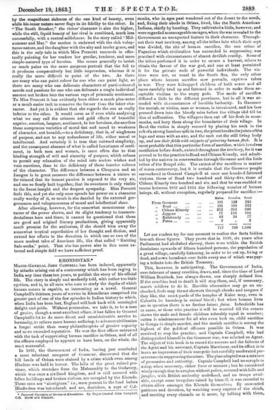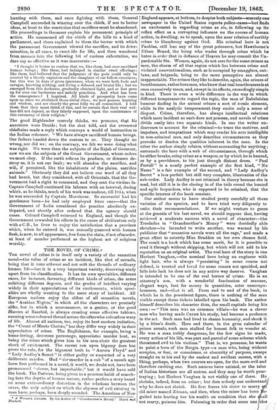KRONDISTAN.*
MAJOR-G-ENERAL JOHN CAMPBELL has been induced, apparently by attacks arising out of a controversy which has been raging in India any time these ten years, to publish the story of his official life. The story is simply and modestly told, with rather too little egotism, and is, to all men who care to study the depths of which human nature is capable, as interesting as a novel. General Campbell's thirteen years of service in Khondistan comprised the greater part of one of the few episodes in Indian history to which, when India has been lost, England will look back with unmingled delight and pride. Without pretension, we take it, to be a man of genius, though a most excellent officer, it has fallen to General Campbell's lot to do more direct and unmistakeable service to humanity, to relieve more human suffering, to advance civilization a longer stride than many philanthropists of greater capacity and more extended reputation. He was the first officer entrusted with the task of suppressing human sacrifice in Orissa, and of all the officers employed he appears to have been, on the whole, the
most successful. -
In 1837, the Government of India, having just concluded a most reluctant conquest of Goomsur, discovered that the hill lands of Orissa were stained by a crime which even among Hindoos was held in horror. The hills of the great ruined pro- vince, which stretches from the Mahanuddy to the Godavery, which was once a civilized kingdom, and is still covered with fallen buildings and broken shrines, are occupied by the Khonds. ,These mea are "aborigines," i.e., were present in the land before $inclooism was introduced, and are, doubtless, a sept of Cal- * Per•onat Narrative of Service in xi:cation. By Major-Geueral John Campbell, C.B. Beret and Blacken,. mucks, who in ages past wandered out of the desert to the south, and, fixing their abode in Orissa, lived, like the North American Indians, chiefly by hunting. They cultivated a little, however, and were regarded asmanageable savagesovhen the war revealed to the Government an unexpected feature in their character. Through- out their vast territory, among all the tribes into which their sept was divided, the rite of human sacrifice, the one crime of Paganism which civilization has succeeded in suppressing, was practised with circumstances of almost devilish cruelty. Some of the tribes performed it in order to secure a harvest, others to obtain the favour of the war god, and one at least permitted it for the private ends of powerful individuals. The vic- tims were not, as usual in the South Sea, the only other place where human sacrifice now prevails, captives taken in war. They were kidnapped children of both sexes and all races carefully bred up and fattened in order to make them ac- ceptable victims to the angry gods. The mode of sacrifice differed a little in the different provinces, but in all it was at- tended with circumstances of horrible barbarity. In Goomsur the meriah, or victim, man or woman, is intoxicated, and his face pressed down into the bloody mire before the village idol till he dies of suffocation. The villagers then cut off his flesh in mum- mocks, and bury them along the boundaries of their village. In Bond the victim is simply secured by placing his neck in the reft of a strong bamboo split in two, the priest breaks the joints ofthe legs and arms with an axe, and the mob cut the still living body up, and sow their fields with snippets of quivering human flesh. It is most probable that this particular form of sacrifice, which involves Mutilation before death, existed throughout the territory, for it was proved to be the practice in Bead and Chinna Kimedy, and admit- ted by the natives in conversation through Goomsur and the little tribes of the Bengal side. The extent of the sacrifices is matter of warm controversy, but it is certain that the Goomsur people surrendered to General Campbell at once one hundred fattened victims, those of Bond two hundred and thirty-five, those of Chinna Kimedy two hundred and six, and that he was enabled to rescue between 1837 and 18.54 the following number of htunaa beings, all, without exception, regularly prepared for sacrifice :—
From Goomsur Males
101 Females.
122
Total.
223 „ Boad 181 164 345 „ Chinna Kimedy 313 353 666 „ Jeypore 77 116 193 „ Balahundy 43 84 77
,,
Patna 2
2
717 789 1,506 Let our readers try for one moment to realize the facts hidden beneath those figures. They prove that in 1837, six years after Parliament had abolished slavery, there were within the British dominions upwards of fifteen hundred persons, the population of a great village, carefully fattening, in order to be cut up, living or dead, and sown broadcast over fields every one of which was pay- ing a tribute into the British Treasury.
This, however, is anticipating. The Government of India, over-tolerant of many cruelties, draws, and, since the time of Lord William Bentinck, has always drawn, one sharply defined line. If the cruelties lead to death it will stop them, and, if necessary, march soldiers to do it. Horrible obscenities may go on un- checked, fools may thrust skewers through cheeks and tongues if they like, the court-yards of the temples of Kalee may, even in Calcutta, be kneedeep in animal blond; but when human lives are in question there is no further laissez faire. Infanticide has to cease, or those who practise it will be worried till the census shows the male and female children tolerably equal in number; suttee is misdemeanour for all who even look on, child sacrifice to Gunge is simple murder, and the meriah sacrifice is among the highest of the political offences possible in Orissa. It was resolved to stop the practice, and Captain Campbell, who had distinguished himself in the Goorosur war, was selected as Agent. The object of this book is to record the success and the failures of the Agent and his assistant, Captain Macviccar, and its effect is to leave an impression of their energetic but carefully moderated per- severance in suppressing the crime. The plan adopted was a mixture of persuasion and authority. Captain Campbell had no scruple in using, when necessary, either force or menace ; but he considered wisely enough that in a region without police, covered with hills and jungles, with British authority undefined, and no troops avail- able, except some irregulars raised by hims?If, it was essential to obtain allies amongst the Khonds themselves. By unwearied patience and devotion, by watching every caprice of the chiefs, and meeting every obstacle as it arose, by talking with them,
hunting with them, and once fighting with them, General Campbell succeeded in winning over the chiefs, if not to better ideas, at least to the conviction that sacrifices must be abandoned.
His proceedings in Goomsur explain his permanent principle of action. He summoned all the chiefs of the hills to a kind of parliament, and there explained to them the horror with which the paramount Government viewed the sacrifice, and its deter- mination, in all cases, to exact life for life, and then wandered from menace into the following bit of curious exhortation, we dare say as effective as it was inaccurate :—
" I thought it better to confess that we, like them, had once sacrificed human beings ; like them, had indulged in similar cruel offerings ; like them, had believed that the judgment of the gods could only be averted by a bloody expiation and the slaughter of our fellow-creatures; but this was in days of gross ignorance, when we were both fools and savages, knowing nothing, and living a debased and brutal life ; but we emerged from this darkness, gradually obtained light, and at last gave up for ever our barbarous and unholy practices. And what has been the consequence ? I inquired. All kinds of prosperity have come upon us since we abolished those sinful rites ; we how possess learning and wisdom, and see clearly the great folly we all committed. I told them that they must think of this, and be certain that their real wel- fare did not depend, as they falsely supposed, upon the continuance of this ceremony of their religion."
The good Highlander scarcely thinks, we presume, that his ancestors were Druids ; but the shot told, and the overawed chieftains made a reply which conveys a world of instruction to the Indian reformer. "We have always sacrificed human beings.
Our fathers handed down the custom to us. They thought no wrong, nor did we ; on the contrary, we felt we were doing what was right. We were then the subjects of the Rajah of Goomsur, now we are the subjects of the Great Government, whose orders we must obey. If the earth refuses its produce, or diseases de- stroy us, it is not our fault; we will abandon the sacrifice, and will, if permitted, like the inhabitants of the plains, sacrifice animals." Obviously they did not believe one word of all they had heard, but they considered, with all Orientals, that the Go- vernment had a right to command, and they sent the victims in.
Captain Campbell continued his labours with an interval, during which, as he thinks, much of his work was undone, till 1851, when he was succeeded by Captain Macviccar. So successful had his gentleness been—he had only employed force once—that the Government of India considered the practice absolutely ex- tirpated, and shortly after ordered that the agency should cease. Colonel Campbell returned to England, and though the Government rewarded his efforts in the cause of civilization only with a C.B., he lives to enjoy the satisfaction that a province which, when he entered it, was annually guanoed with human flesh, is now, to all appearance, free from the stain, if not of murder, at least of murder performed as the highest act of religious worship.



































 Previous page
Previous page